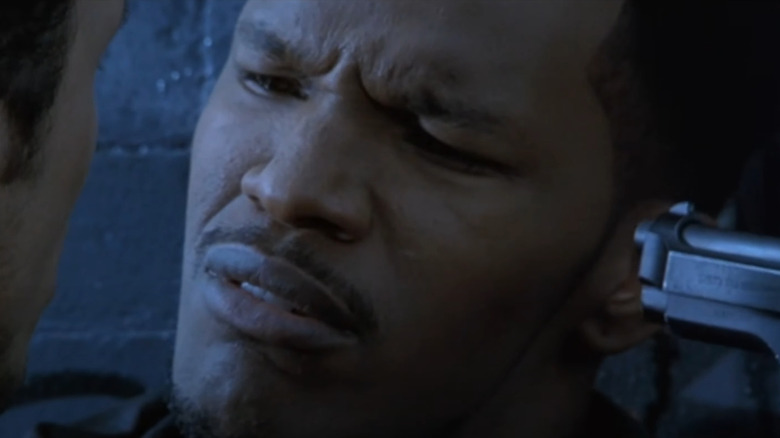Andor Creator Tony Gilroy Wrote A Disastrous Jamie Foxx Flop
Tony Gilroy's strengths as a writer are on full display in "Andor," which closes out its glorious two-season run on a beautiful, bittersweet note. It's bittersweet, mind you, because there may never be another "Andor," as its presence within the "Star Wars" franchise has set an anomalous storytelling standard like no other. Gilroy seems to understand the nuances of a world at the mercy of corrupt Imperial rulers, wherein the average civilian must choose to rise up, take a stand, and fight back against tyranny. There are no flashes of lightsabers or vague prophecies; only a faint hope that the right to freedom is a contagious (and spontaneous) idea. The show is also one of the few instances in which a prequel retroactively makes its successor better, as "Rogue One: A Star Wars Story" is now more heartbreaking and fleshed out thanks to "Andor."
Apart from penning the scripts for the first three "Bourne" films (and directing the fourth entry), Gilroy previously teamed up with writers Andrew and Adam Scheinman to pen "Bait," the 2000 action-comedy starring Jamie Foxx. It didn't do well at the box office at all, grossing a mere $15.5 million against a production budget of $51 million. Needless to say, this massive financial failure cost Warner Bros. a ton of money, and the fact it received mixed-to-negative reviews didn't do "Bait" any favors either. The writers, including Gilroy, cannot be held completely responsible for the outcome though, as director Antoine Fuqua (who has made gripping, kinetic films like "Training Day") later admitted that he wasn't particularly passionate about the project to begin with. This is also understandable, as not every directing job can be a passion project and not every script sticks the landing despite the efforts of those involved in crafting it.
While critics took issue with the film's uninspired music video aesthetics and formulaic structure, they were unanimously positive about one aspect: Jamie Foxx. Indeed, the actor's turn as the movie's protagonist, Alvin Sanders, is undoubtedly impressive, as it salvages Fuqua's film from being unwatchable. At this point, Foxx had yet to establish himself as a gifted dramatic performer, though he would go on to impress everyone even more with "Ali" (which was released in 2001), followed by his electrifying work in Michael Mann's "Collateral" three years after that.
Bait is far from perfect, but it has some really fun moments
It would be a disservice to both Gilroy and Fuqua to call "Bait" atrocious, as the film has several highlights that make for a decently fun experience. Here, petty thief/hustler Alvin is arrested after stealing prawns and ends up sharing a cell with John Delano Jaster (Robert Pastorelli), a big-time thief who double-crossed his dangerous partner, Bristol (Doug Hutchinson). While being interrogated by Treasury Agent Edgar (the brilliant David Morse), Jaster seemingly dies from heart failure, but not before conveying a cryptic final message to his cellmate Alvin. You might be able to guess what happens next: The police use Alvin as bait to catch the murderous Bristol, who will stop at nothing before retrieving the money he was cheated out of. But Bristol is a shrewd man, ready to pounce on Alvin before he can make any moves.
One of the glaring issues with "Bait" is its visual style, as Fuqua employs his signature style, mixing grittiness with music video-style flashiness. The result is an exercise in excess, as Fuqua is unable to strike a balance between the dramatic and comedic elements in the story, which is why they end up feeling so disparate despite being thematically linked. We're supposed to find humor in Alvin's shenanigans due to his bumbling nature, but we also feel a sense of dramatic immediacy with Bristol, as his presence evokes menace and unpredictability. While the respective actors nail these individual character quirks, there's little cohesion between these moods, which makes most of "Bait" feel tonally jarring.
There are also some ridiculous moments thrown in for good reason, but I would argue that these silly little diversions make "Bait" worth your time. The humor flows best when it is underplayed thanks to Foxx's impeccable comedic timing, which is used to constantly elevate the most underwritten character moments. Moreover, we soon learn that Alvin's demeanor is just a front to protect himself from being exploited, which makes Foxx's performance even more layered than it seems. This is the point where we realize that the pawn in question was never really the bait to begin with, causing "Bait" to morph into a slick little thriller. These exciting story moments are few and far between, but they're cultivated sincerely enough to warrant giving "Bait" a chance.

